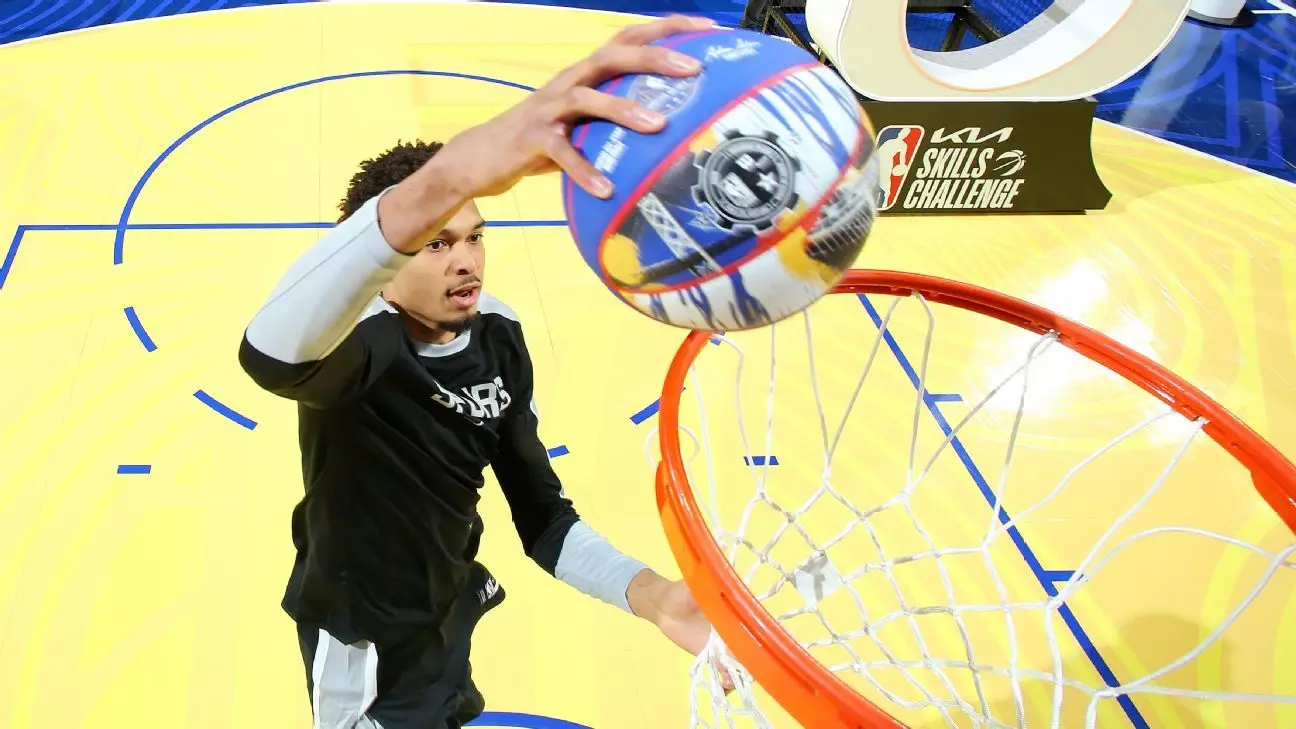The Kia Skills Challenge showcased a thrilling competition among the NBA’s elite talents, culminating in a dynamic showdown between Team Cavs, led by Donovan Mitchell and Evan Mobley, and Team Warriors, featuring Draymond Green and Moses Moody. However, the event was not without its fair share of drama. The disqualification of Team Spurs — comprised of Chris Paul and Victor Wembanyama — stirred debate and raised questions about the nuances of competition rules, highlighting the impact strategic decisions can have in high-stakes scenarios.
In what can only be described as a well-executed performance, Team Cavs clinched victory with an impressive time of 1:00.03. This achievement stands testament to both Mitchell and Mobley’s coordinated teamwork and individual skills. What makes their win particularly noteworthy is their ability to navigate the obstacle course that included a mixture of shooting and passing challenges. Their execution embodied the essence of basketball, balancing speed with precision, allowing them to emerge victorious.
In contrast, Team Warriors displayed ferocity and teamwork as well, but ultimately fell short. Their commendable performance underscored the nature of the Skills Challenge as not just a display of athletic ability, but also of strategic acumen — the fine line between winning and losing often hinges on these variables. Thus, the narratives of both winning and losing teams serve to enrich the overall excitement of the event, illustrating how competitive dynamics shift and evolve during such challenges.
The Spurs’ Attempt at Innovation: A Risky Strategy or a Misunderstanding?
The situation surrounding Team Spurs, which ended in their disqualification, invites a greater examination into the decisions made leading up to the event. Paul and Wembanyama’s choice to prioritize passing over shooting can be seen as an ambitious strategy, bent on maximizing their time. They completed the first round quickly, clocking in at 47.9 seconds, but their lack of valid shot attempts proved detrimental. Disqualification not only signifies a failure to clarify rules but raises concerns about the accountability of officials in such scenarios.
Following the event, Paul expressed frustration with how the rules were interpreted. His statement indicates a clear desire to innovate within the established framework, but perhaps they gambled too heavily on an untested approach. The fundamental question arises — did Team Spurs fully understand the implications of their strategy, or did they misinterpret the rules allowing for their unshooting approach? This form of negligence can overshadow the skill they brought to the competition, ultimately changing the narrative of their participation.
Draymond Green’s candid remarks about the situation illuminate the broader concerns that linger after Team Spurs’ disqualification. Wembanyama’s inquiries into the legality of their strategy suggest a proactive approach that ultimately backfired. With various officials being asked for clarification, the lines between creativity and rule-breaking seem to blur, demanding a reevaluation of both official guidelines and player interpretations.
The controversy raises essential questions about the future of the Skills Challenge. As it stands, the incident may serve as a cautionary tale, urging both the league and its players to approach rule interpretation more carefully. If the current challenge framework cannot accommodate innovative strategies without leading to confusion or disqualification, it might be time for the NBA to refine its rules. A clear delineation between what is permissible can foster a more competitive field while simultaneously encouraging creativity within the boundaries of the game.
Reflecting on the events of the Kia Skills Challenge provides critical insights into the complexities of competitive sports at the professional level. The juxtaposition of Team Cavs’ success against the backdrop of Team Spurs’ disqualification offers invaluable lessons: the importance of understanding rules, the risks associated with innovative strategies, and the role communication plays in high-pressure competition. Moving forward, these factors are not only crucial for players but also for league officials tasked with ensuring the integrity and fairness of the game. The Skills Challenge remains a celebration of skill and creativity; however, this incident underscores the significance of clarity and adherence to rules in maintaining that spirit.

